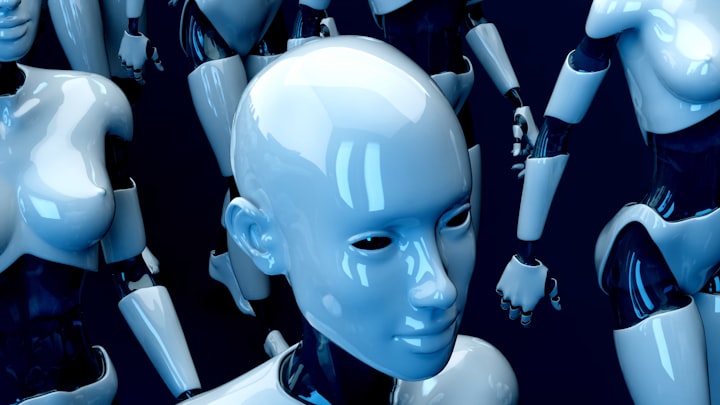Revolutionizing Healthcare
The Impact of Artificial Intelligence

Introduction:
In recent years, artificial intelligence (AI) has emerged as a transformative force across various industries, revolutionizing the way we live and work. One area where AI has shown immense potential is healthcare. With its ability to process vast amounts of data, recognize patterns, and make informed predictions, AI is reshaping the landscape of medical practices, research, and patient care. This article explores the profound impact of AI in healthcare and its potential to revolutionize the industry.
The Rise of AI in Healthcare:
1.1. Enhancing Diagnostics:
AI-powered algorithms are improving diagnostic accuracy, enabling early detection of diseases, and reducing human error. Machine learning models can analyze medical images, such as X-rays and MRIs, with remarkable precision, assisting radiologists in identifying anomalies that may have been overlooked.
1.2. Personalized Medicine:
AI algorithms can analyze patient data, genetic information, and treatment outcomes to develop personalized treatment plans. This approach ensures that healthcare interventions are tailored to an individual's unique characteristics, maximizing treatment effectiveness and minimizing adverse effects.
1.3. Streamlining Administrative Tasks:
AI-driven automation systems are transforming administrative tasks, such as scheduling appointments, managing electronic health records, and handling billing processes. This automation frees up healthcare professionals' time, allowing them to focus more on patient care.
AI in Medical Research:
2.1. Accelerating Drug Discovery:
Traditional drug discovery is a time-consuming and costly process. AI algorithms can analyze vast amounts of molecular data, helping researchers identify potential drug candidates more efficiently. By simulating and predicting drug interactions, AI expedites the development of new therapies.
2.2. Precision Medicine Research:
AI enables researchers to analyze vast datasets to identify genetic markers, biomarkers, and other factors associated with specific diseases. This information helps in understanding disease mechanisms, developing targeted therapies, and predicting treatment responses.
AI for Remote Patient Monitoring:
3.1. Remote Health Monitoring Devices:
AI-powered wearable devices, such as smartwatches and fitness trackers, allow individuals to monitor their health continuously. These devices can track vital signs, sleep patterns, and physical activity, providing valuable data for early detection and prevention of health issues.
3.2. Telemedicine and Virtual Assistants:
AI-driven telemedicine platforms facilitate remote consultations, bringing healthcare services to individuals regardless of their geographical location. Virtual assistants powered by AI can provide basic medical advice, triage patients, and offer guidance for self-care.
Ethical Considerations and Challenges:
4.1. Privacy and Data Security:
As AI relies on vast amounts of personal health data, ensuring privacy and data security is crucial. Healthcare organizations must implement robust protocols to safeguard patient information and adhere to ethical guidelines.
4.2. Bias and Fairness:
AI algorithms are only as unbiased as the data they are trained on. To prevent biases and ensure fairness, healthcare providers and developers must carefully curate diverse datasets and continuously monitor and update algorithms for potential biases.
4.3. Human-AI Collaboration:
While AI offers numerous benefits, it should complement rather than replace human healthcare professionals. Maintaining a balance between human expertise and AI capabilities is essential to ensure high-quality patient care.
Future Prospects and Implications:
5.1. Predictive Analytics:
AI's predictive capabilities can be harnessed to identify population health trends, forecast disease outbreaks, and allocate healthcare resources more effectively. By analyzing vast amounts of data from various sources, AI can help healthcare providers make proactive decisions and implement preventive measures.
5.2. Robotics and Surgical Assistance:
AI-powered robotics is transforming the field of surgery. Surgical robots equipped with AI algorithms enable precise and minimally invasive procedures, reducing risks and improving patient recovery. Surgeons can also benefit from real-time guidance and assistance during complex operations.
5.3. Mental Health Applications:
AI has the potential to revolutionize mental health care by analyzing speech patterns, facial expressions, and other behavioral cues to assess and predict mental health conditions. Chatbots and virtual therapists powered by AI can offer support, therapy, and early intervention, increasing access to mental health services.
Adoption Challenges and Implementation Strategies:
6.1. Data Integration and Interoperability:
To fully leverage AI's capabilities, healthcare systems need to integrate and streamline data from various sources, such as electronic health records, wearable devices, and medical imaging. Interoperability standards and data-sharing frameworks are essential to enable efficient AI-driven healthcare systems.
6.2. Skill Development and Training:
Healthcare professionals need training and upskilling to effectively leverage AI technologies. Educational programs and continuous learning opportunities should be provided to ensure healthcare workers can adapt to the changing landscape and work collaboratively with AI systems.
6.3. Regulatory Frameworks and Ethical Guidelines:
Regulatory bodies and policymakers play a crucial role in establishing frameworks and guidelines for the responsible development, deployment, and use of AI in healthcare. Ethical considerations, transparency, and accountability must be at the forefront to build public trust and ensure the ethical implementation of AI technologies.
The Impact on Healthcare Delivery and Accessibility:
7.1. Rural and Underserved Areas:
AI has the potential to bridge the healthcare gap in rural and underserved areas by enabling remote consultations, telemedicine, and AI-powered diagnostic tools. This technology can connect patients with healthcare professionals and specialists, regardless of geographical limitations, improving access to quality care.
7.2. Resource Optimization:
AI can help healthcare institutions optimize their resources by predicting patient inflow, identifying bottlenecks in operations, and streamlining workflows. This optimization leads to improved efficiency, reduced waiting times, and better allocation of healthcare resources, ultimately benefiting patients and healthcare providers alike.
7.3. Global Health Impact:
The application of AI in healthcare extends beyond individual institutions and has the potential to address global health challenges. By analyzing data from diverse populations, AI can identify disease patterns, track epidemics, and contribute to the development of effective public health interventions worldwide.
Public Perception and Trust:
As AI becomes more integrated into healthcare, addressing public perception and building trust is essential. Transparency in AI algorithms, clear communication of benefits and limitations, and involving patients in decision-making processes can help foster trust and acceptance of AI technologies.
Collaboration and Partnerships:
Collaboration between healthcare providers, technology companies, researchers, and policymakers is crucial for the successful implementation of AI in healthcare. By fostering interdisciplinary partnerships, sharing expertise, and pooling resources, stakeholders can collectively drive innovation and address the challenges associated with AI integration.
Conclusion:
The widespread adoption of AI in healthcare has the potential to revolutionize the industry, transforming diagnostics, research, patient care, and accessibility. However, careful consideration must be given to ethical concerns, data privacy, bias, and the need for human-AI collaboration. With responsible implementation and a focus on addressing challenges, AI can enhance healthcare delivery, optimize resource allocation, and improve patient outcomes. By embracing the potential of AI while upholding ethical principles, the healthcare industry can embrace a future where technology and human expertise work hand in hand to provide high-quality, accessible, and patient-centric care.
About the Creator
Derick Okwa
I am a fun and easing going guy who loves nature and the beautiful creatures inhabiting the earth with us. More reason I write articles about them.






Comments
There are no comments for this story
Be the first to respond and start the conversation.